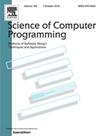Preface for the special issue on selected software artifacts from DisCoTec 2023 – the 18th International Federated Conference on Distributed Computing Techniques
IF 1.4
4区 计算机科学
Q3 COMPUTER SCIENCE, SOFTWARE ENGINEERING
引用次数: 0
Abstract
This special issue includes a selection of the artefacts presented at the 18th International Federated Conference on Distributed Computing Techniques (DiScoTec 2023), held at the NOVA University Lisbon (Lisbon, Portugal), in June 18-23, 2023. The federated conference included: COORDINATION 2023, the 25th International Conference on Coordination Models and Languages); DAIS 2023, the 23rd International Conference on Distributed Applications and Interoperable Systems; and FORTE 2023, the 43rd International Conference on Formal Techniques for Distributed Objects, Components, and Systems. All the three conferences welcomed submissions describing technological artefacts, including innovative prototypes supporting the modelling, development, analysis, simulation, or testing of systems in the broad spectrum of distributed computing subjects. The artefact evaluation chairs have selected a subset of high-quality accepted artefacts to be invited for submission to this special issue. Following the revision process, nine artefacts have been accepted to be part of this special issue. The published contributions include different types of artefacts, including programming libraries, frameworks, as well as tools for the analysis, verification, and simulation of distributed systems.
为第18届分布式计算技术国际联合会议上精选软件工件的特刊序言
本特刊精选了在第18届国际分布式计算技术联合会议(DiScoTec 2023)上展示的作品,该会议于2023年6月18日至23日在里斯本NOVA大学(葡萄牙里斯本)举行。联合会议包括:协调2023(第25届国际协调模型和语言会议);第23届分布式应用和互操作系统国际会议(dais2023);以及FORTE 2023,第43届分布式对象、组件和系统的形式化技术国际会议。所有三个会议都欢迎提交描述技术工件的文件,包括支持分布式计算主题的广泛范围中的系统建模、开发、分析、模拟或测试的创新原型。人工制品评估主席已经选择了一个高质量的被接受的人工制品的子集被邀请提交到这个特别的问题。经过修订过程,九件文物已被接受为本期特刊的一部分。已发布的贡献包括不同类型的工件,包括编程库、框架,以及用于分析、验证和模拟分布式系统的工具。
本文章由计算机程序翻译,如有差异,请以英文原文为准。
求助全文
约1分钟内获得全文
求助全文
来源期刊

Science of Computer Programming
工程技术-计算机:软件工程
CiteScore
3.80
自引率
0.00%
发文量
76
审稿时长
67 days
期刊介绍:
Science of Computer Programming is dedicated to the distribution of research results in the areas of software systems development, use and maintenance, including the software aspects of hardware design.
The journal has a wide scope ranging from the many facets of methodological foundations to the details of technical issues andthe aspects of industrial practice.
The subjects of interest to SCP cover the entire spectrum of methods for the entire life cycle of software systems, including
• Requirements, specification, design, validation, verification, coding, testing, maintenance, metrics and renovation of software;
• Design, implementation and evaluation of programming languages;
• Programming environments, development tools, visualisation and animation;
• Management of the development process;
• Human factors in software, software for social interaction, software for social computing;
• Cyber physical systems, and software for the interaction between the physical and the machine;
• Software aspects of infrastructure services, system administration, and network management.
 求助内容:
求助内容: 应助结果提醒方式:
应助结果提醒方式:


